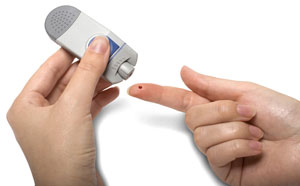Evidence of Alpha Lipoic Acid's Antidiabetic Effectiveness in Clinical Studies
| Study Details | Alpha Lipoic Acid Form/Dosage |
|---|---|
|
Open clinical study involving: (iv.78)
|
600 mg of alpha lipoic acid twice a day for 3 months. (iv.78) |
| Outcomes | |

Comparing results of blood tests before and after treatment showed that alpha lipoic acid: (iv.78)
|
|
| Study Details | Alpha Lipoic Acid Form/Dosage |
|
Open clinical study involving: (iv.79)
|
600 mg of alpha lipoic acid twice a day for 4 weeks. (iv.79) |
| Outcomes | |
|
Alpha lipoic acid: (iv.79)
|
|
| Study Details | Alpha Lipoic Acid Form/Dosage |
|
Randomized, double-blind, placebo-controlled clinical trial involving: (iv.50)
|
1800 mg/day oral alpha lipoic acid in 400-600 mg doses 30 minutes before meals for 20 weeks. (iv.50) |
| Outcomes | |
|
Alpha lipoic acid decreased the marker for average blood glucose levels in subjects who were also diabetic. (iv.50) |
|
| Study Details | Alpha Lipoic Acid Form/Dosage |
|
Randomized, double-blind, placebo-controlled clinical trial involving: (iv.53)
|
300, 600, 900, or 1200 mg/day oral alpha lipoic acid broken out into 3 equal doses 30 minutes before meals for 6 months (along with patients' regular diabetes medication). (iv.53) |
| Outcomes | |
|
Alpha lipoic acid: (iv.53)
Although the researchers noted that the results did not reach statistical significance, they indicated this was likely due to the small number of study participants. The only adverse effects possibly related to alpha lipoic acid reported were 1 patient who dropped out of the study due to weight loss and 2 who reported skin rash. (iv.53) |
|
| Study Details | Alpha Lipoic Acid Form/Dosage |
|
Open clinical study involving: (iv.54)
|
600 mg of alpha lipoic acid twice a day for 16 weeks. (iv.54) |
| Outcomes | |
|
Alpha lipoic acid increased insulin sensitivity in patients with polycystic ovary syndrome. (iv.54) |
|
| Study Details | Alpha Lipoic Acid Form/Dosage |
|
Prospective, randomized, double-blind, placebo-controlled study involving: (iv.47)
|
300 mg/day oral alpha lipoic acid supplement (along with regular, non-insulin diabetes medication) for 90 days. (iv.47) |
| Outcomes | |
|
Alpha lipoic acid: (iv.47)
Alpha lipoic acid also reduced average fasting blood sugar levels by almost 3%, but it did not reach statistical significance. (iv.47) |
|
| Study Details | Alpha Lipoic Acid Form/Dosage |
|
Pilot clinical study involving: (iv.57)
|
600 mg slow-release alpha lipoic acid in combination with 300 mg benfotiamine twice daily for 28 days. (iv.57) |
| Outcomes | |
|
Alpha lipoic acid: (iv.57)
|
|


